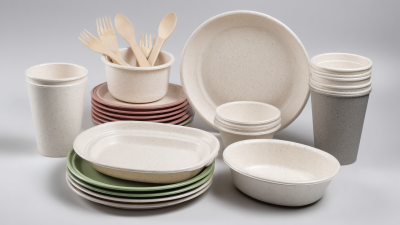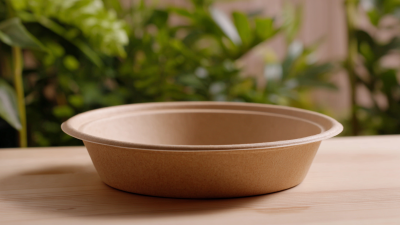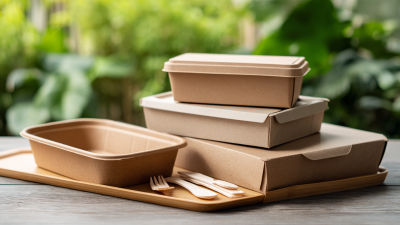In recent years, the push for sustainable dining solutions has gained unprecedented momentum, driven by alarming statistics that highlight the environmental toll of single-use plastics. According to a report by the World Economic Forum, the global plastic waste could outweigh fish in the oceans by 2025 if current trends continue. In response to this crisis, innovative alternatives like Biodegradable Small Plates are emerging as viable and eco-friendly options for restaurants and consumers alike. These plates, made from natural materials such as sugarcane, palm leaves, and wheat straw, not only significantly reduce landfill waste but also decompose within a few months, unlike traditional plastic which can take centuries to break down. By adopting Biodegradable Small Plates, the foodservice industry is taking crucial steps toward sustainability, aligning with the growing consumer demand for responsible dining practices, as highlighted in recent surveys where over 70% of diners expressed a desire for sustainable options.

The environmental impact of traditional disposable plates has become a pressing concern as society increasingly grapples with the consequences of plastic waste. Currently, the growth of the pulp disposable tableware market reflects a broader shift towards more sustainable dining options, with projections revealing an increase from $11 billion in 2024 to $17.5 billion by 2032, marking a compound annual growth rate of 5.97%. This surge in demand is driven by heightened environmental awareness and the urgent need for alternatives to traditional plastic tableware, which significantly contributes to pollution.
In line with this trend, there is a notable transition in various sectors towards adopting biodegradable materials like PLA (Polylactic Acid). As major companies pivot to compostable packaging, we witness a tangible effort to reduce environmental harm associated with single-use plastics. This transition is supported by market trends indicating a remarkable growth in the biodegradable tableware sector, fueled by the demand for eco-friendly options to mitigate the adverse effects of plastic waste. Such changes are crucial in addressing the serious long-term implications of plastic pollution on our planet.
Biodegradable small plates are quickly becoming an essential aspect of sustainable dining, largely due to their eco-friendly nature. One promising alternative to traditional plastic plates is bagasse pulp, derived from sugarcane waste. This material not only helps reduce agricultural waste but also offers a biodegradable solution that aligns with the principles of a circular economy. The global market for eco-friendly paper plates is expected to grow significantly, with projections indicating an increase from $3.5 billion in 2024 to $5.8 billion by 2033. This growth reflects the rising consumer demand for sustainable disposable tableware that does not compromise on quality or environmental impact.
Moreover, the areca plates market is also gaining momentum, as areca palm leaves provide a natural and biodegradable option that is increasingly favored in various regions, including Bangladesh. This shift towards biodegradable materials is enhanced by market reports indicating that the Indian biodegradable tableware and packaging products market is anticipated to reach approximately $2.06 billion in 2023, growing at a CAGR of 6.0% by 2030. These trends illustrate a consumer preference for alternatives that are not only functional but also environmentally responsible, paving the way for a future where sustainable dining is the norm.
Biodegradable small plates are gaining traction in sustainable dining. The chart above highlights key reasons why they are considered eco-friendly, demonstrating their importance across various metrics.
The rise of biodegradable small plates in sustainable dining reflects a significant shift towards eco-friendly dining solutions. Innovative materials, such as PLA (polylactic acid), derived from renewable resources like corn starch, and bagasse, a byproduct of sugarcane processing, are at the forefront of this trend. According to a report from the Biodegradable Products Institute, products made from these materials can decompose within 90 to 180 days in commercial composting conditions, offering a stark contrast to traditional plastic plates that can take centuries to break down.
Furthermore, advancements in technology have led to the emergence of molded fiber plates that utilize recycled paper and cardboard. These plates boast impressive structural integrity while maintaining environmental sustainability. A comprehensive industry analysis by Smithers reported that the global market for biodegradable single-use tableware is expected to reach $4.5 billion by 2025, signaling a growing demand for environmentally responsible options among consumers and businesses alike. With these innovative materials paving the way for a greener hospitality landscape, biodegradable small plates are undoubtedly becoming integral to sustainable dining practices.
| Reason | Description | Materials Used | Biodegradability Time |
|---|---|---|---|
| Eco-friendly | Made from natural materials, reducing plastic waste. | PLA (Polylactic Acid), Sugarcane | 60-90 days |
| Compostable | Breaks down in compost, enriching soil. | Palm Leaf, Bamboo | 2-4 months |
| Durable | Strong enough to hold hot, cold, and wet foods. | Bamboo, Wheat Straw | 2-6 months |
| Stylish | Available in modern designs for appealing presentation. | Sugarcane, Starch-based plastics | 60-90 days |
| Lightweight | Easy to carry and serve, great for events. | PLA, Palm Leaf | 2-4 months |
| Versatile | Suitable for a variety of cuisines and occasions. | Wheat Straw, Bamboo | 2-6 months |
As the demand for sustainable dining options continues to rise, biodegradable small plates are proving to be a cost-effective choice for restaurants and events. These plates, typically made from materials such as sugarcane, bamboo, or palm leaves, not only help reduce environmental impact but also offer financial benefits. When comparing the costs associated with traditional plastic and disposable options, businesses find that investing in biodegradable solutions often leads to long-term savings. While the initial investment may be slightly higher, the reduced costs for waste disposal and potential tax incentives for eco-friendly practices can make all the difference.

Moreover, using biodegradable plates can enhance a restaurant's brand image and appeal to environmentally-conscious consumers. Events aiming to attract sustainable-minded attendees benefit greatly from this shift in dining ware. Many planners are now prioritizing eco-friendly products and are willing to pay a premium for services that align with their sustainability goals. By incorporating biodegradable plates into their offerings, establishments not only position themselves as leaders in the green movement but also tap into a growing market that increasingly seeks out responsible dining solutions. This trend reflects a significant transformation in consumer preferences, where sustainability and cost-effectiveness go hand in hand.
As consumer awareness around sustainability continues to rise, the dining industry is witnessing a significant shift towards environmentally friendly options, such as biodegradable small plates. A recent PwC survey revealed that consumers are willing to pay an average of 9.7% more for sustainably sourced goods, reflecting a growing trend where health and the environment take precedence even amid economic challenges like inflation. This readiness to invest in sustainable dining solutions underscores a broader pattern: consumers are increasingly prioritizing clean label ingredients, reliable quality, and sustainability in their food choices.
Moreover, the market for environment-friendly products is projected to reach impressive figures, with an expected CAGR of 6.8% from 2025 to 2034. This growth is driven by a collective consumer demand for healthier, sustainable food options, pointing to an industry-wide commitment to prioritizing taste and quality without compromising on environmental responsibility. As more people seek to align their dining habits with sustainable practices, biodegradable small plates serve as a practical solution, ensuring that every meal can be enjoyed guilt-free while contributing to a greener future.







